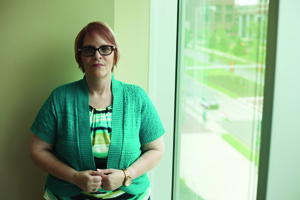 Debbie Morgette. Photo by Spencer PortisSarah Faulkner - Editor-in-Chief
Debbie Morgette. Photo by Spencer PortisSarah Faulkner - Editor-in-Chiefeditor@insideuab.com
UAB has recently added a new outlet for students impacted by sexual assault, relationship violence – also known as domestic or dating violence – stalking and sexual harassment. Debbie Morgette, who serves as an assistant director of Student Advocacy, Rights and Conduct is now specializing in survivor services and campus based victim advocacy for UAB students. Providing dedicated, full-time support to survivors of trauma ensures that survivors can reach an advocate whose sole responsibility is to support their needs.
What sets Morgette apart from other confidential resources is that she can thoroughly explain to students the student conduct and legal process, explain students’ Title IX rights, provide information about Protection from Abuse Orders and No Contact Orders. She can also coordinate Title IX accommodations for students such as extensions on class assignments, on campus housing changes, or providing police escorts.
Confidential resources have always been available to students. Parties such as UAB counselors, medical providers and clergy are all confidential resources. This means they cannot share personally identifiable information about a student without their expressed permission.
There are exceptions, however: “If a student shared with me that the person who harmed them used a gun during the assault or abuse, or if the person who harmed them has been involved in a similar situation (pattern of behavior), I would need to share that information with the police and our Title IX Coordinator and Title IX Deputy Coordinator,” Morgette said. “Any imminent threat to the student or community is shared with John Jones, Ph.D., who is the interim Title IX Coordinator or Emily Feinstein who serves as our Title IX deputy coordinator.”
Morgette can also accompany students to any meeting they have about their situation.
“If the student wants me to accompany them to court, I am happy to do so,” Morgette said. “It is my honor to support students and help them navigate through all the complexities they are facing.”
“A survivor who has experienced any type of power based personal violence is making a decision to walk through my office door,” Morgette said. “They are expecting to be helped, not judged. I 100 percent believe a student who makes that decision to talk with me. Do you know how courageous that is?”
Morgette described the process of coping with trauma as a journey that is unique to every individual.
“It is easy to understand why some people that have experienced trauma would rather not talk about the traumatic event they have had,” Morgette said. “Maybe they feel ashamed, or embarrassed, or that nobody will believe them. [...] Students can share whatever information that wish to share with me. I don’t drive the conversation. The student does. I am here to support and provide information. How can I support you? What can I do to help you? What information do you need? It is so important for students to have accurate information so that they can make informed decisions about what steps to take for their lives. They are the expert of their own life, not me.”
Although Morgette is not a counselor, she said that she is well aware of the effects of sexual or physical or emotional abuse. She also serves as a rape response advocate.
“I see the pain individuals are experiencing. I never want a student to suffer in silence,” Morgette said. “There is support, there are resources, there is hope.”
While Morgette has been outreaching to faculty, staff, and students about the services she is providing, she said that college should not be the first time conversations about power-based personal violence prevention and responses should take place.
“Conversations about consent need to be happening in middle and high school, even kindergarten, in an age appropriate manner. For example, you can talk to a child in kindergarten about consent without mentioning sexual activity,” Morgette said, who used an orange as a demonstration.
“Sam has an orange, and Jessie takes the orange away from Sam. A teacher can ask, Jessie, did you ask Sam if you could have their orange? It’s important that you ask if you can have their orange, not just take it. How do you think Sam feels about you taking their orange?” Morgette said. “There is no reason we can’t have age appropriate conversations about consent. Reality is, by the time students come to college, many of them have already experienced sexual violence or abusive behavior.”
While Morgette’s services are available to current UAB students, the trauma that the student experienced or is experiencing does not necessarily need to be current or related to UAB in order for her to meet with the individual and discuss the issues the student is facing.
“It doesn’t matter when the experience happened, it doesn’t matter where, the point is – the most important thing is to provide that student the support that they deserve,” Morgette said. “If the abuse happened and had no relation to UAB, it happened in high school, middle school, childhood, whenever, I want students to seek out the support and resources that are available to them.”
To contact Debbie Morgette in Student Advocacy, Rights and Conduct, call the SARC office at 205-975-9509 and ask to speak with the confidential advocate. The office is located in the Hill Student Center, Suite 303.


